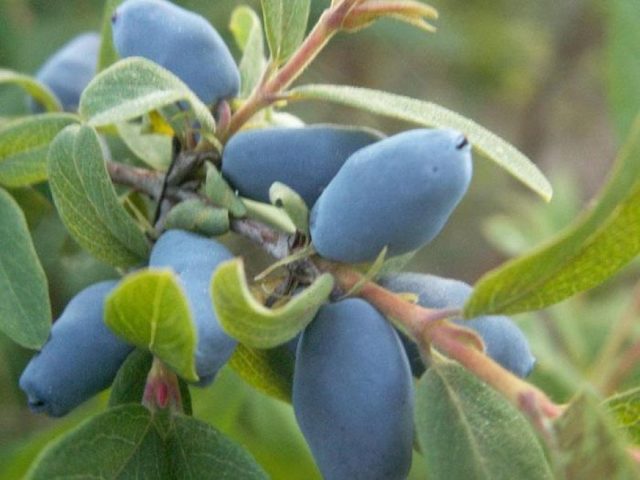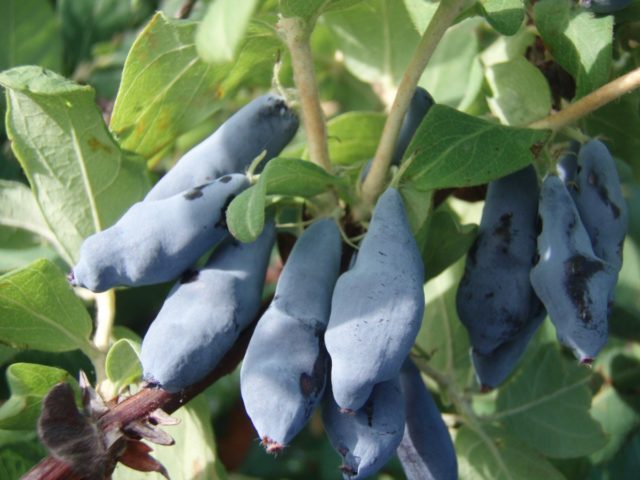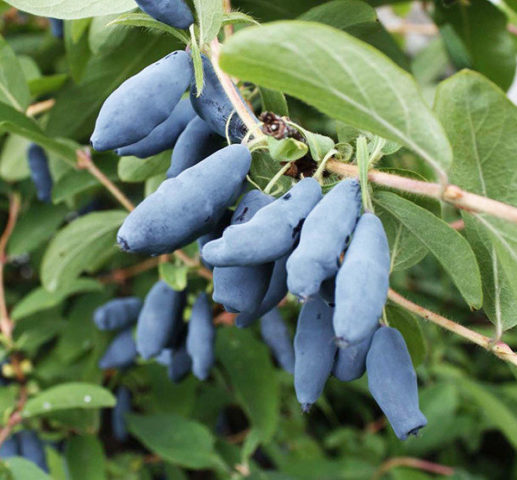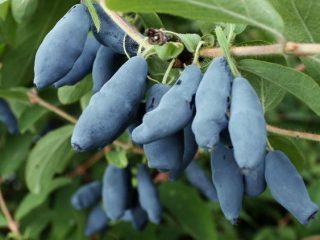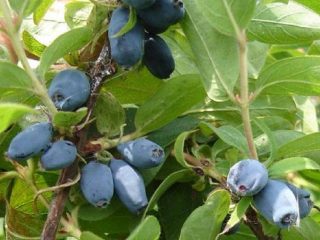Content
Honeysuckle is a rare guest of domestic household plots. It is difficult to explain such a modest interest in this culture, because it is distinguished by its high decorative and taste qualities. Russian gardeners simply do not have information about this shrub. A description of the variety, photos and reviews of Violet honeysuckle will help you get to know the unique plant better.
Description of Honeysuckle Violet Le-Japanese
This variety belongs to both decorative and dessert varieties. Slightly spreading tree grows up to 1.5 m. The crown is round, dense, the branches fit tightly to the trunk. The shoots are thickened, do not bend during the growth process. The color of the bark is gray-green, brown.
The leaves are oblong, large, their color is bright green, the leaf plate is flat. The flowers are not large, do not exceed 2 cm in diameter, at first they are painted in a pale green tint, later they become creamy white.
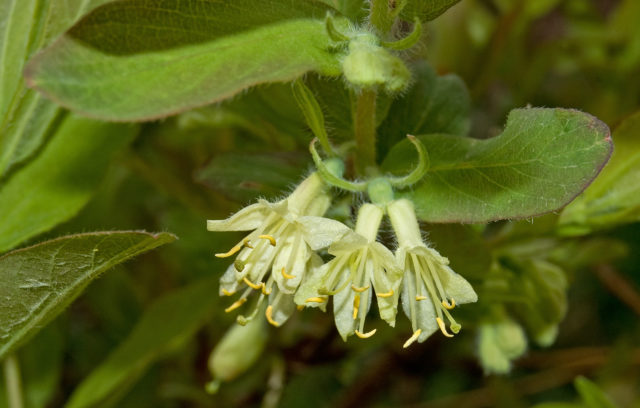
On the peduncle there is a pair of buds, each of which consists of 5 reed petals
The modest color of the shrub, as in the photo, gave the florists the idea to name one of the white varieties of violets Japanese honeysuckle.
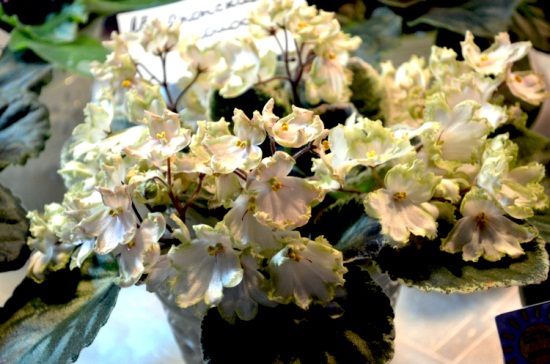
Flowers are delicate and dim, like the very honeysuckle Violet
At the end of May, the first fruits of Violet honeysuckle ripen. They are not large, their weight does not exceed 1.5 g. The color of the berries is dark blue, the surface is bumpy, uneven. The length of the fruit is approximately 3 cm.
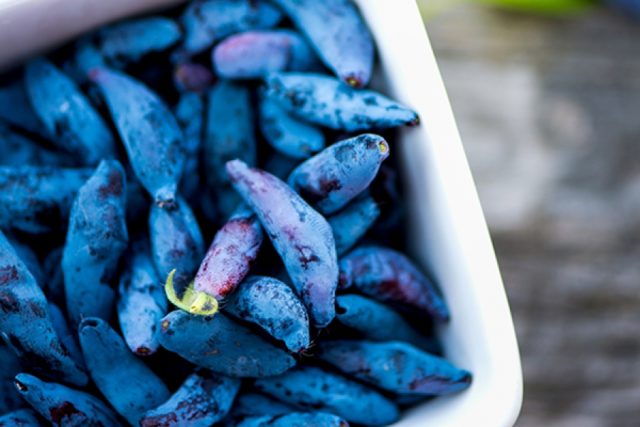
Ripe, ready-to-eat berries are covered with a waxy coating
She has a pleasant, delicate aroma, the flesh consists of a large number of fibers, the taste is sweet, with a slight sourness. The palatability of the fruit is estimated at 4.8 points.
Planting and caring for honeysuckle Violet
The variety is planted in an open, well-lit area. In the shade, Violet honeysuckle does not bear fruit well, the fruits become smaller, become sour.
The soil should be loose, fertile, well ventilated. Swampy areas for planting are best avoided.
Before rooting, ash and sand are introduced into the hole in equal parts.
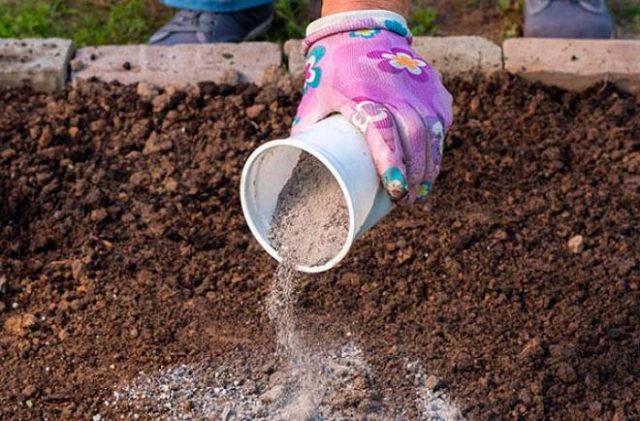
Sand and ash are necessary for the seedling to quickly begin
After rooting, organic fertilizers are used: humus, manure, compost.
Honeysuckle variety Violet is recommended to be planted in autumn. In spring, the shrub wakes up early, it is difficult to root it before the onset of steadily warm weather. In this case, the tree may not be accepted or hurt for a long time.
A week before the rooting of the Violet honeysuckle seedling, they weed the site, carefully dig up the ground.
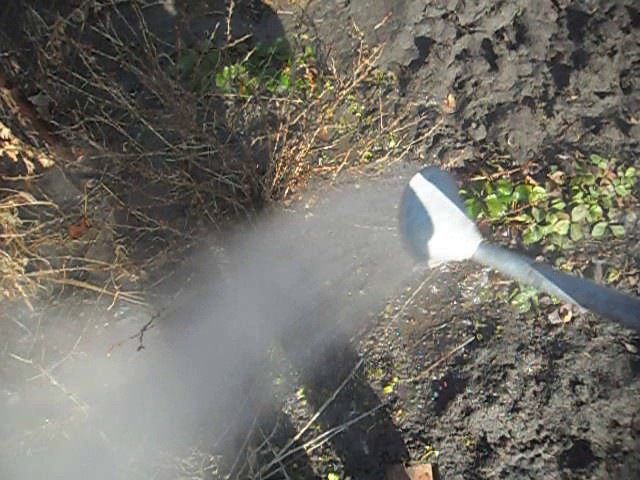
You can spill the soil with boiling water to destroy all possible pests.
The planting holes are dug out a little larger than the volume of the rhizome of the Violet honeysuckle seedling. Usually 50x50x50 cm in size. The distance between the seedlings should be at least 1.5 m.
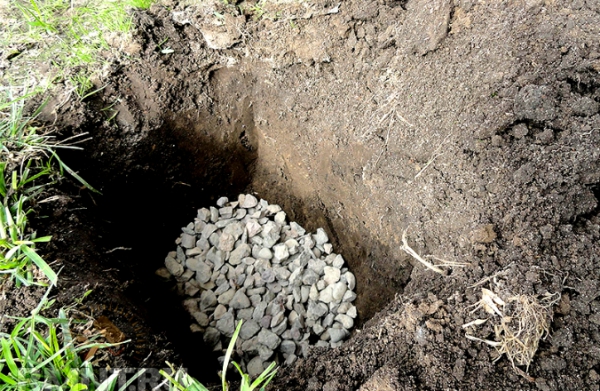
Drainage is laid out at the bottom of the hole: expanded clay, broken brick or stone
Pour earth mixed with humus and sand on top. The hill should take up a little more than half of the hole. A seedling is placed on top of it. Its rhizome should fit freely in the hole.

The root collar cannot be underground, only flush with it or 1 cm above the surface
The rhizome is covered with the same fertile mixture on which it is located. Then the earth is rammed, the plant is watered with warm, settled water.After watering, the trunk circle is mulched with a thick layer of straw. This coating will help to retain moisture.
After planting, the Violet honeysuckle variety is watered regularly. The earth around the trunk is loosened. Several times a month it is necessary to renew the mulch layer so that the soil does not rot under it. After watering, it is imperative to fluff the soil so as not to disrupt air exchange. The access of oxygen is important to the plant roots.
Acidified soils are spilled with ash (1 liter per 15 liters of water). The procedure is carried out 1 time per season. The first 2 years after planting, Violet honeysuckle is not fed.
Reproduction of honeysuckle fruit Violet
Cuttings are considered the most effective propagation method for this variety. As soon as the first green fruit ovaries appear on the tree, they begin to prepare the cuttings.
It is better to cut off shoots in damp, cloudy cool weather. For cuttings, strong green branches of the current year are chosen. For subsequent reproduction, the middle part of the shoot is suitable; it must have a pair of leaves on it.
The length of the handle should not exceed 15 cm.

At the top, the branch is cut straight, at the bottom - at an angle of 45 ᵒ, while trying to keep the buds, retreating from them 1 cm
The resulting children are planted in a mixture of peat and sand (1: 3). The air temperature in the room should be 20-22 ᵒС, humidity - 85%. To create such conditions, the container with seedlings is covered with foil and watered regularly.
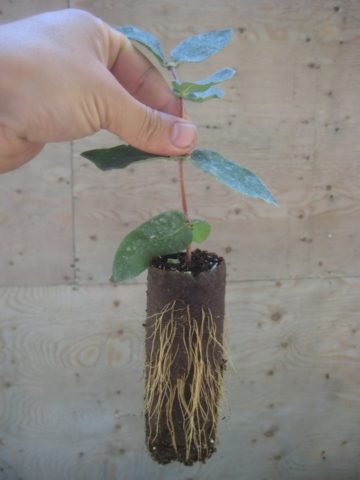
After 10 days, young plants will have roots
After that, the film is removed, the temperature in the room is reduced by opening the windows.
Also edible honeysuckle lonicera edulis Violet can be propagated by seeds and layers. But these methods are less effective. They are rarely used in horticulture.
Honeysuckle pollinators Violet
The variety belongs to self-fertile, cross-pollinated crops. It is not difficult to find useful neighbors for the bush.
Honeysuckle Violet is cross-pollinated with the following varieties:
- Viola is an ornamental shrub with high fruit taste.
One of the varieties of the old selection, which has established itself over time
- Amphora is a large-fruited variety, the berries of which tolerate transportation well.
Mistresses consider this berry the best for preservation.
- The blue spindle is a drought-resistant and frost-resistant variety of Siberian selection.
Depending on climatic conditions and care, fruits become sour, sweet or bitter
Pollinating varieties are planted near Violet honeysuckle. The distance between the shrubs is maintained at least 1.5 m. This is necessary so that the crown grows well and the branches do not break off.
Diseases and pests of honeysuckle edible violet
The variety is resistant to many pests and diseases of fruit crops. Violation of the rules of agricultural technology, improper care lead to the fact that Violet's honeysuckle may die.
If the foliage of the shrub begins to turn yellow, curl and fall off, it means that the culture was attacked by aphids.
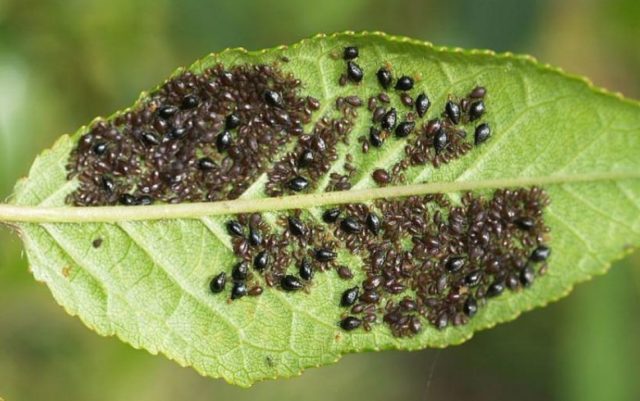
To prevent the appearance of aphids on the Violet honeysuckle, in early spring make sure that there are no anthills nearby
If the insect has already attacked the bush, it is treated with pesticides. For the best effect, cover with a film on top, leave it overnight.
The leafworm also destroys the green growth of Violet honeysuckle. The insect crawls onto the bush from other fruit trees.
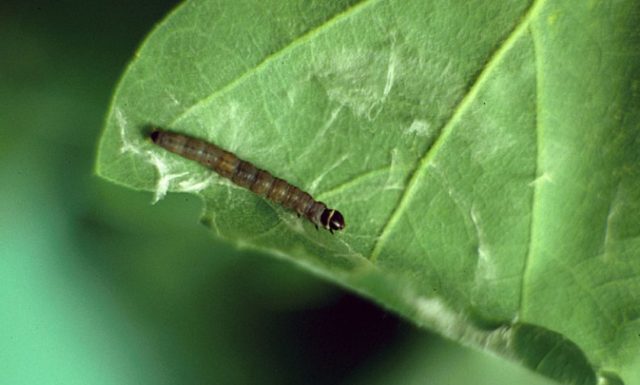
The pest appears in May, during the ripening period of blue honeysuckle berries Violet
If there are few insects, they are collected by hand and destroyed. With a large accumulation of caterpillars, they are fought with pesticides.
If the summer is cold, heavy rains are frequent, Violet's honeysuckle can wilt from fungal diseases. The most common of these is powdery mildew.

The appearance of a whitish bloom on the leaves indicates their defeat by the fungus.
To destroy this pathogen, chemical preparations containing copper (Copper sulfate) are used.For preventive purposes, in the spring, after the snow melts, Violet's honeysuckle is treated with Bordeaux liquid.
Conclusion
A full description of the variety, photos and reviews of Violet honeysuckle will help novice breeders of this culture. It is worth planting it on every personal plot. This plant is not only beautiful, it bears fruit abundantly with tasty, healthy fruits, can serve as a hedge or ornamental shrub.
Reviews of honeysuckle Violet
Reviews of gardeners about Violet honeysuckle are almost always positive. This is not surprising, it rarely happens that tasters evaluate the taste of a berry by almost 5 points.
